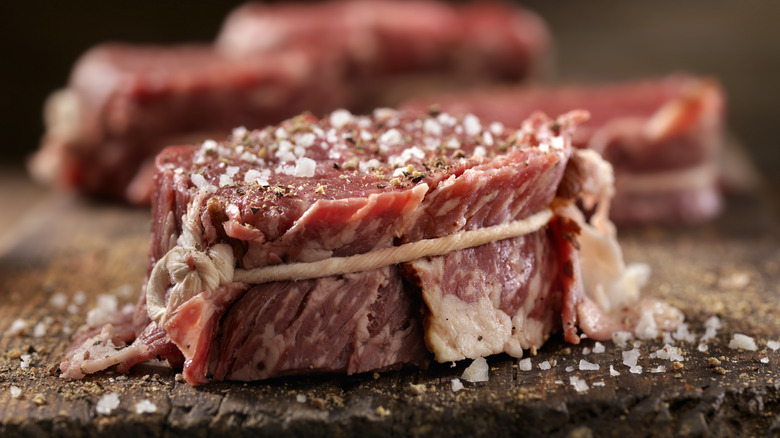For The Best Steak, You Absolutely Need To Use This Type Of Salt
There might be a number of dishes that we can forgive anyone for not being fussy about. Pasta? They're all great. Tacos? There's no way to go wrong. But steak? That's where particularities come in. Everyone has their favorite cut of steak, their preferred level of doneness, and even their favorite sides. It doesn't matter if it's a filet mignon with a glass of wine and roasted veg or steak and eggs, every step of cooking steak is important — and salting steak correctly is vital.
Even Anthony Bourdain gave his top tips for salting steak on the grill, and he said that getting an even coating with a high-quality salt is of the utmost importance. And that brings us to the salt itself, as it turns out that for all the time you might spend picking out an ideal steak, you should put the same consideration into salt. For the best outcome, you'll want a coarse salt with large flakes, and that means your standard table salt just isn't going to cut it.
Instead, opt for kosher salt — but not all kosher salt is created equal. With that in mind, let's talk about the best salt to use for steak, why it's important, and why it works so well.
The large flakes of kosher salt will make seasoning steak easy
Properly seasoned meat means you'll need even, complete coverage, and the best way to get that is by sprinkling salt from a height of around a foot. The professionals don't just do that for show; it actually helps cover the surface of your steak more evenly. But that also means grains of salt can bounce everywhere, and that's one of the main reasons that kosher salt is the way to go — a coarse salt is going to cling to the surface of the meat better and make it easier for you to get an even coverage. However, keep in mind that you'll want to be a little picky about the kosher salt you use.
The different manufacturing processes used to create kosher salt mean that there are two different shapes: flat and pyramid-shaped. Think of it this way: Coarse is good, and while all kosher salt is coarser than table salt, pyramid-shaped grains of kosher salt are more coarse than flat grains. That's exactly what you want.
That means when you sprinkle from above, grains will stick evenly, where they'll not only add flavor, but draw moisture out of the top layer of the meat. That dry surface will then allow the steak to develop a crispy, flavorful brown sear on the outside, without putting your steak in danger of overcooking.
Meats are what kosher salt was meant for
Today, kosher salt is such a familiar sight on shelves and in kitchens that it's easy to forget that it was originally part of an ancient religious practice. Kosher dietary guidelines are an involved set of Jewish laws that dictate not only how foods can be eaten, but how they're prepared. Among those rules is one that states that no meat may be eaten if it contains blood, and that's where kosher salt comes in.
For generations, kosher salt has been used to prepare meat for use under Jewish dietary regulations, and it still is — even though not all kosher salt that's on grocery store shelves has been officially certified by a Jewish regulatory body. The coarse grains of kosher salt were perfect for drawing blood from meat and making sure that it met religious standards, so it makes sense that it's the same properties — the ability to draw moisture from the meat — that make it perfect for prepping your favorite steak.
By now, you might be wondering about sea salt, so here's a fun footnote. Kosher salt is essentially processed sea salt, and the main difference is in the size of the crystals. It still has the clean flavor of sea salt with the coarse, chunky grains you want for your steak — it's the best of both worlds.


